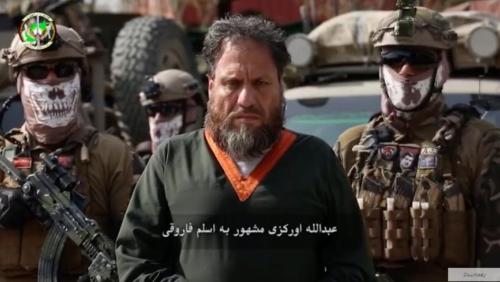Afghanistan: Prosecute Head of ISIS-linked Group
Ensure Due Process, Victim Role in War Crimes Trial
The Afghan government should bring appropriate war crimes charges against Aslam Farooqi, leader of the Islamic State of Khorasan Province (ISKP), an affiliate of the Islamic State (ISIS), for his alleged role in directing attacks against civilians in Afghanistan, Human Rights Watch said on April 06, 2020. Farooqi, whose real name is Abdullah Orakzai, should be afforded a fair trial in accordance with international human rights standards, including ensuring that victims and witnesses to these attacks can testify at the trial.

The Afghan National Directorate of Security (NDS) released this image of Abdullah Orakzai, also known as Aslam Farooqi, the leader of an ISIS affiliate.
On April 4, 2020, Afghanistan’s intelligence agency, the National Directorate of Security, announced that they had arrested Farooqi, in Kandahar province. Farooqi had replaced the group’s former leader, known as Abu Omar Khorasani, in July 2019, after the group suffered setbacks under pressure from military operations by the United States, the Afghan government, and the Taliban.
“Farooqi’s arrest is an opportunity for the Afghan authorities to show that they are capable of securing fair justice for victims of war crimes and other atrocities,” said Patricia Gossman, associate Asia director. “Victim participation is key to ensure that justice is not only done, but seen to be done, by those most affected by Farooqi’s crimes.”
The ISKP has claimed responsibility for numerous attacks in Afghanistan that have killed civilians. In the most recent incident, the armed group claimed responsibility for the March 25 attack on a Sikh temple in Kabul that killed at least 25 people. From 2016 through 2018, ISKP suicide bombers attacked dozens of Shia mosques and other facilities in Kabul and other cities, killing and injuring thousands of civilians.
Afghanistan has a poor record in bringing individuals implicated in human rights abuses and war crimes to justice. The government currently holds thousands of detainees under overly broad terrorism laws but it has not charged any suspects with war crimes or crimes against humanity. Trials of terrorism suspects are held in secret and often rely on confessions coerced under torture. The authorities have made no efforts to solicit victims’ participation in the trials.
Afghanistan incorporated war crimes and crimes against humanity as part of its 2017 penal code. Article 337 of the code defines war crimes to include intentionally directing attacks against the civilian population, and intentionally directing attacks against buildings dedicated to religion and education. The attorney general’s war crimes unit has carried out investigations into some attacks by ISKP, but until now there have been no prosecutions under these laws.
“Afghanistan owes it to the victims to carry out a credible prosecution and fair trial of Aslam Farooqi and others accused of serious crimes,” Gossman said. “The pursuit of justice is essential if Afghanistan is to bring an end to such violence.”
Source:Human Rights Watch
- 284 reads
Human Rights
Ringing FOWPAL’s Peace Bell for the World:Nobel Peace Prize Laureates’ Visions and Actions

Protecting the World’s Cultural Diversity for a Sustainable Future

The Peace Bell Resonates at the 27th Eurasian Economic Summit

Declaration of World Day of the Power of Hope Endorsed by People in 158 Nations

Puppet Show I International Friendship Day 2020

